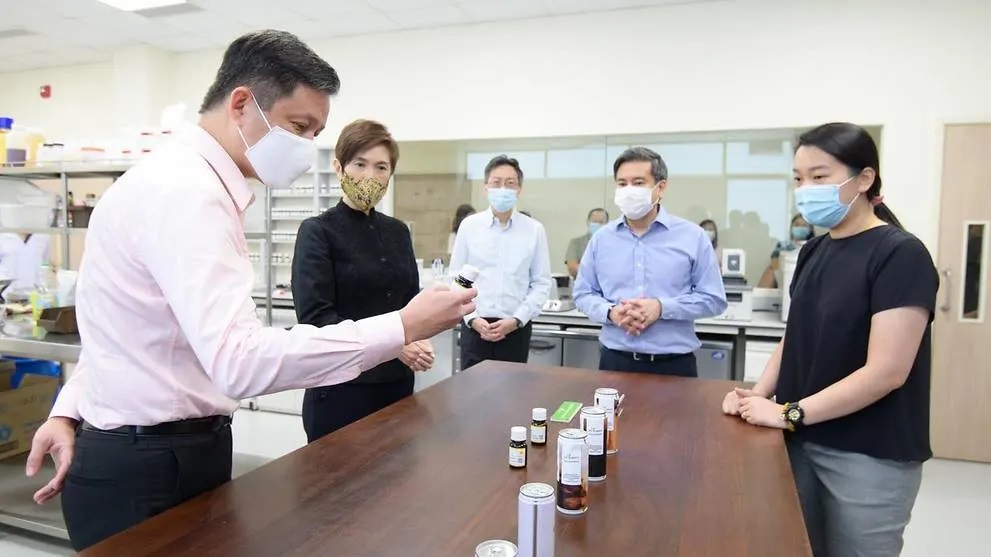
Minister for Trade and Industry Chan Chun Sing and Minister for Manpower Josephine Teo during a visit to food flavouring manufacturer KH Roberts.
SINGAPORE: Despite the impact of the COVID-19 pandemic, more than 800 companies in the food sector have offered about 6,700 opportunities in jobs, traineeships and training places since April.
Of these, 5,420 have been for jobs, of which 2,070 (about 38 per cent) have been for professional, manager, executive and technician (PMET) roles. These include roles such as food technologists, chefs and business development managers.
These figures were released on Monday (Sep 21) in the sixth edition of the Ministry of Manpower’s (MOM) jobs situation report, with focus on the food sector.
For PMET positions, salaries for food and beverage (F&B) services managers ranged between S$2,450 and S$3,300, and between S$2,500 and S$6,050 for manufacturing managers.
For non-PMET roles, waiters’ salaries ranged between S$1,500 and S$2,000, while food processing supervisors and general foremen’s salaries ranged between S$2,250 and S$2,750.
Between April and July, more than 1,800 people have found jobs or took on new roles in the food sector through WorkForce Singapore’s programmes. About 56 per cent of such individuals were aged 40 and above, said MOM.
IMPACT OF COVID-19
Singapore’s food sector employees more than 48,000 people in food manufacturing and more than 180,000 in food services.
Food manufacturing comprises more than 940 enterprises and contributes 1.1 per cent of Singapore’s gross domestic product (GDP), while food services include more than 10,000 enterprises and contribute about 0.8 per cent of the country’s GDP.
The impact of COVID-19 on the food manufacturing sector has been “uneven”, with companies manufacturing staple food and those that sold their products through retail channels seeing a 30 per cent to 70 per cent surge in sales.
However, companies supplying hotels, restaurants, cafes and food services saw a 40 per cent to 90 per cent decline in sales.
Hiring in the food manufacturing sector has mirrored these business trends.
The food services sector has been harder hit by the pandemic and “had to cope with manpower shortage and low footfall” due to the “circuit breaker” period to stem the spread of COVID-19.
Prior to Phase 2 of Singapore’s reopening, many workers were redeployed to other “revenue opportunities”, such as food deliveries.
Speaking to reporters during a visit to food flavourings and ingredients manufacturer KH Roberts, Minister for Trade and Industry Chan Chun Sing noted that Singapore’s food manufacturing industry had seen a compounded annual growth rate of about 6.45 per cent per annum between 2013 and 2018.
Despite its performance taking a hit during the circuit breaker period, the industry is continuing its growth trajectory, he said.
The COVID-19 pandemic has made people more conscious of the need for food security, said Mr Chan, noting that Singapore’s experience with agri-tech, as well as research and development, give the country a competitive advantage.
“We think that there’s a bright future for this industry to create many more jobs for our people,” he said.
Minister for Manpower Josephine Teo pointed to Workforce Singapore’s Job Redesign Reskilling Programme for the food services industry.
The programme, introduced in February this year, supports the business transformation of food services companies as well as the reskilling of existing workers.
“As at the end of August 2020, close to 900 of the existing workers across 25 food services companies have been, or are being trained and redeployed into new and higher value roles,” said Mrs Teo.
“For the workers who have been re-skilled, they not only get a chance to keep their jobs, but also acquire new skills and take on higher value tasks, of course (with) scope for them to earn higher wages when the economy improves,” she said.
She encouraged job seekers to consider different job scopes, even if they have no experience in the sector, as long as they came with the right attitude and are willing to learn.
“For those who are coming from sectors where they have transferable skills, such as in innovation management or manufacturing practice, they will certainly have a more seamless experience to tune into the food sector, but there will still be specific skills that they will need to pick up for the food sector,” she said.
Mr Chan also noted that the country will introduce a new “Singapore brand mark”, with the aim of allowing local products to stand out among international competitors.
The mark, to be introduced in November, will apply to a variety of consumer lifestyle products such as fashion accessories, as well as beauty and wellness products.
This will allow Singapore companies and products to command a premium on the international market, said Mr Chan.
“Now, how does that relate to jobs? For Singapore, we do not compete on the basis of price, but we compete on the basis of our quality. So as we expand the market for such quality products, then there’ll be more opportunities for Singaporeans in these industries that we’re talking about,” he said.

